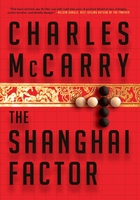The fall rain slapped against the moving train as it slowed to enter Shady Grove station, the last stop on the Red Line that snaked through the Washington subway system like a boomerang gone awry. Burns welcomed the rain. He could wear his long trench-coat collar up and a rain-resistant khaki fedora pulled down low. He was certain it made him less conspicuous without having to resort to his usual subterfuges. Today as usual he wore a paste-on black moustache and a pair of tortoise shell eyeglasses. In his locked desk drawer at the newspaper, he had a good supply of generic, store-bought frames of different shapes and sizes, and a number of paste-ons that he could vary as he saw fit, the objective being to make it difficult to pin down an accurate description.
Carol was a willing collaborator in what they had agreed was a very dangerous liaison. Both had, he thought, carefully and intelligently assessed the risks; devastation to their marriages, of course, but even those could be subject to some semblance of resurrection, mostly to protect their teenage children who were still an integral part of both households.
Burns and his wife had a daughter, Barbara, who was a college sophomore at Harvard, and a fifteen-year-old, Lisa. McGrath and her husband also had a fifteen-year-old only child, Deirdre. The teenagers were students at the National Cathedral School, a prestigious all-girls middle school in Washington.
The daughters were teammates on the girls' soccer team, and it was there, as spectators and doting parent carpoolers, that Adam Burns had met Carol McGrath. Despite the incendiary relationship that it had spawned, they agreed that it was miraculous, life changing, incandescent, fateful, and—whatever risk it entailed—worth the danger and sacrifice.
Each considered themselves good, loving parents and devoted spouses. This did, they admitted in their many brief post-coital moments of repose, sound somewhat hollow and certainly hypocritical, but to them, their rationalization made absolute sense. They were mysteriously enslaved by the wildly orgasmic bliss created between them.
"We are addicted to this," she often told him.
He agreed absolutely. Their sexual hunger for each other had broken all boundaries and its intensity had increased with frequency. It had been going on once, more often twice a week for about ten months. Both knew it was beyond all reason, beyond personal discipline, beyond rational behavior. They feasted on each other like savages. They would often berate themselves for what they called, their "awfulness," a critique that characterized their sexual impulses as reaching the outer limits of perversity.
That very rebuke was an added turn-on. All the elements of this elaborate subterfuge, these carefully contrived deceptions and disguises added to their excitement from the very moment the details of the assignation entered their minds, like the lighting of a fuse that reached its explosive destination on contact.
They never used cars. License plates were identifiable. Ever alert, they rode only public transportation, specifically the Metropolitan Washington subway system—but never together—checking into carefully researched motels or small hotels within walking distance to the stations. They never followed the same subway line or stayed at the same place in sequence, and debarked in different stations. They only purchased one-time, one-way tickets, which they discarded after reaching their destination. On their way to a rendezvous, they avoided all eye contact, commanding total isolation, burying their faces in newspapers. They never took their cell phones, which were traceable, and did not carry anything that could identify them, like licenses, credit cards, or business cards. Wallets were left in their offices. They carried only cash. To all intents and purposes, they were anonymous.
Nor did they entertain any plans for a relationship beyond their current involvement. Above all, they had no intention of ever leaving their spouses. They reveled in the idea that they were leading secret lives, totally apart from family and careers, existing in a kind of delicious, fenced-off netherworld where sexual pleasure and passion reigned supreme. Before parting they inspected each other's clothing and bodies. They reveled in the process.
Communication required the utmost caution. From the beginning, they had eschewed any text messages or emails, a total ban. Information, based on Carol's experience as a lawyer and a judge, could be reconstituted. They risked only an occasional call from a diminishing stock of pay phones or an anonymous store phone somewhere, but only in an emergency.
So far, there had been only one emergency, a car crash in which Burns' wife was shaken up and rushed to the hospital. Burns had been out of touch for three hours. Luckily, she was not hurt. He had told her his cell battery had died, an explanation his wife accepted without question. Never had he given her any cause to doubt his fidelity.
Burns and McGrath had agreed on a half-hour grace period. Using a disguised voice, often accented, he booked via pay phone only places that did not have lobbies and rooms that faced a parking lot. To designate a room number after an all-cash check in, he would place a red sticky note on the door handle. They had invented an elaborate code. If she did not show after the half-hour grace period their tryst was aborted. Rarely did they fail to connect.
He would check in first under an assumed name. His choices were Eastern European names like Mzishinski or Pzorki, unpronounceable and impossible to spell. Room clerks knew the drill. Burns suspected that they pocketed the cash. In the rooms, they never used the phone and, in another paranoid action, wiped every surface free of fingerprints. Carol thought it was going too far, but cooperated. They were also careful to muffle sounds, a feat sometimes requiring a pillow to mute her. She was a screamer when she came.
They were careful about timing. At the very least, a three-hour interval in their schedules was required. It meant deft creativity for Carol, being a federal appeals judge.
Adam had less time constraints. His schedule was his own. He was a columnist syndicated by the Washington Post. His caustic, ferocious criticisms of the president and the current administration circulated worldwide three times a week. For the Post, which was liberal, he was an aberration, but his readership was wide and loyal, and the newspaper put business ahead of its political bias in Burns' case. His columns also allowed the Post to prove their evenhandedness.
Despite his politics, the paper tolerated Burns, and despite the avalanche of criticism—including death threats—he was well liked and often characterized, with a wink, as the Post's bad boy. He was, at least publicly, castigated by administration figures and party loyalists as a dangerous liar, but many disgruntled employees within the administration fed him inside dirt.
Adam and Carol had to be creative and imaginative in the use of deception with everyone to whom they had a responsibility at home or at the office. Lying was difficult at first, since both of them had trouble weaning themselves from their ingrained ideas about integrity, loyalty, and honesty, that is, until they discovered the overwhelming power of their sexual attraction. It was, they discovered, the ultimate addiction.
A rearrangement of schedules was a necessity. At times Burns had to beg off his regular twice-weekly morning squash games at the Army and Navy Club with his closest friend, Jack Perkins, who worked for an important and powerful senator and with whom he had always shared his most intimate confidences—except, of course, the secret relationship with Carol McGrath.
Once he had prided himself on never missing a squash game. For the last ten months, he had to concoct a story that allowed him to postpone his participation if it interfered with his trysts with Carol. To do this, he invented a bad knee, using the excuse to cancel his game when such a conflict arose.
Sometimes his meetings with Carol were early morning, sometimes early afternoon, mostly during the day, but never on weekends. Family obligations were harder to rearrange. Because of their careers, there could be no set pattern. Carol's regular tennis games at the Chevy Chase Club were another complication, when times and absences had to be carefully planned to deflect any suspicion.
At times, the affair had impacted their roles as cheerleaders, sometimes missing their daughters' games, or worse, using the games as an excuse, employing the time for their more obsessive and addictive purposes. There was, of course, a fault line here, but as busy people, they could get away with the subterfuge, even though they might suffer their children's disappointment.
When they did attend the matches or were thrown together as parents at meetings, they were cautious in their socializing, rarely sitting together or even conversing, and above all, avoiding eye contact, which was often difficult. Ironically, Lisa and Deidre had once been close friends. For some reason they had had a falling out and were now mortal enemies, although as teammates, paradoxically, they worked smoothly together. Both were strikers and high scorers. The erratic nature of teenage girls in the first flush of the hormonal surge was unpredictable. For Adam Burns and Carol McGrath, this was not a source of despair, for if their children were close friends, they would be thrown together in social situations, which might have made their parents careless or foolhardy lovers, and inadvertently would have exposed their secret lives.
Burns' columns championed such virtues as integrity, justice, honesty, and transparency, and chastised those who did not live by them. His rants against the President and the Administration were based on such values. His use of such words as lies, deceit, chicanery, and mendacity were sprinkled throughout his articles. His distaste for the President and his cohorts was intense. Some said his critiques were over the top.
More than once he had been persuaded by influential parties to cool his rhetoric. His editors and those who bought the column for their publications, most of whom disagreed with his point of view, rarely cautioned him to be more circumspect and less confrontational. When they did, it only made him more indignant and critical, but due to the popularity of his column he often prevailed. When death threats arrived, he felt validated.
As a judge, Carol had the reputation that branded her as left of center, a genuine classic liberal. She had been appointed by Clinton and was considered a phenomenon for being younger than most appointees. She made certain her written opinions stayed reasonably independent, just far enough over the left part of the median strip to keep her critics guessing as to how she really stood on the usual hot-button issues. She had been prominently mentioned for the short list of appointment to the Supreme Court.
What Democrats called the "right-wing conspirators" championed Burns' columns. Despite Carol's more neutral persona based on her judicial decisions, she was, in her heart, at a completely opposite end of the political divide from Burns. "You are in the belly of the beast," she would chide him, although they never discussed those issues that divided them.
Her career ambition to be a Supreme Court justice had been her motivating obsession—that is, until this sexual madness descended upon her and took an odd precedence. She assured herself that one had little to do with the other and pursued both with equal fervor.
Carol was fifty-four years old and up until meeting Burns, had never experienced passion, never had an orgasm, never participated in anything but missionary-position sex. Her husband, an internist, gave her security, warmth, kindness, and support. He adored her, and she returned these virtues in kind. Their infrequent sexual congress was faked, perhaps on his part as well. Until she met Burns, she was certain that that part of her life was of little consequence, a marital necessity only. He was nine years her junior.
In the conventional sense, she was not an obvious beauty. She had allowed the gray to seep into her dark hair, which she wore short and deliberately manageable. Her face was round, and chins had begun to sag slightly. Underneath her strictly business wardrobe, she once had an hourglass figure, with still-high, full breasts and a well-formed large firm butt. Burns thought her ravishing and could not get enough of her sexually. Such passion and preference was mutual.
Burns was tall, lean and muscular, dark curly-haired, with craggy features and piercing Wedgwood blue eyes.
She told him he was as gorgeous and as perfect as Michelangelo's David, and he called her his Venus de Milo with arms. They had also invented odd names for their private parts. She called his dick "Richard," his testicles "Ping and Pong." Her vagina was the "Snapping Tiger" and her rear "Balaam's Door."
They had no trouble reaching long ecstatic orgasms multiple times when they were sexually engaged. It was beyond madness, they both agreed; often during after-play, their dialogue set off joint hysterics. They believed that the intensity of their pleasure was an anatomical miracle.
She had her own disguises, a variety of baseball hats to hide her hair. She wore sunglasses, and on the occasions of their trysts, never the same outfit. Both knew that the slightest whiff of scandal in the present cutthroat environment of Washington would be a media event to be feared and avoided at all costs, especially for her.
His career, he felt certain, would escape damage. Who was interested in the private life of a newspaper columnist? To some it might reveal a kind of hypocrisy, a version of consorting with the enemy, which might dilute the effects of his attacks against the President and what he termed a "corrupt and rotten administration." Indeed, in his heart, he was a libertarian and despised anything that impinged on personal freedom and liberty.
If brought to light, she knew that she could be permanently scuttled in her bid to become a Supreme Court justice, interfering irrevocably with her carefully constructed career plan. She was, after all, a federal appellate judge in one of the most powerful courts in the land. The scandal that would ensue and the resultant media barrage would leave her badly wounded in her major quest, although she might, with luck, escape with her lifetime appointment to the appeals court intact.
Exposed to public scrutiny, they knew they would look ridiculous. The obsessive attraction they felt for each other was baffling. And yet at this moment in time, it was the most cataclysmic event that had ever happened to either of them.













